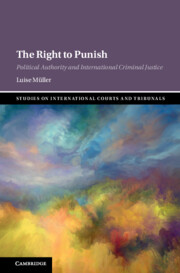Book contents
- The Right to Punish
- Studies on International Courts and Tribunals
- The Right to Punish
- Copyright page
- Contents
- Acknowledgements
- Abbreviations
- 1 Introduction
- 2 The Permissibility of Punishment
- 3 The Authority to Punish
- 4 Legitimate Authority and International Institutions
- 5 Fairness, Equality, and Democratic Authority
- 6 Conclusion
- Works Cited
- Index
3 - The Authority to Punish
Published online by Cambridge University Press: 16 May 2024
- The Right to Punish
- Studies on International Courts and Tribunals
- The Right to Punish
- Copyright page
- Contents
- Acknowledgements
- Abbreviations
- 1 Introduction
- 2 The Permissibility of Punishment
- 3 The Authority to Punish
- 4 Legitimate Authority and International Institutions
- 5 Fairness, Equality, and Democratic Authority
- 6 Conclusion
- Works Cited
- Index
Summary
In this chapter, I discuss how and why the sovereignty of states can be pierced. I presuppose that persons have basic human rights independently of their membership in any political community and that we all share a duty to enforce those rights for everyone. Normally, we discharge this duty through a system of just states in a moral division of labour. A state’s legitimate power over its people and territory depends on its performance in protecting those rights. But when states fail to protect the fundamental human rights of their citizens, not only is outside interference permissible, but the duty to preserve humankind falls back to everyone. In that situation, we all have an equal right to punish perpetrators of human rights crimes. Finally, I turn back to Locke to argue that since we are all equals in the state of nature, our natural executive right must be exercised competitively. But because such competitive punishment is incompatible with our equal status as moral authorities, we have reason to leave the state of nature and submit to an impartial institution that exercises the right on our behalf.
Keywords
- Type
- Chapter
- Information
- The Right to PunishPolitical Authority and International Criminal Justice, pp. 47 - 74Publisher: Cambridge University PressPrint publication year: 2024

